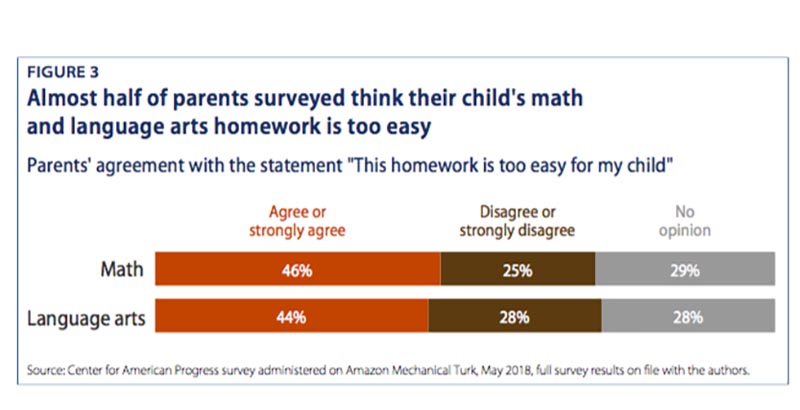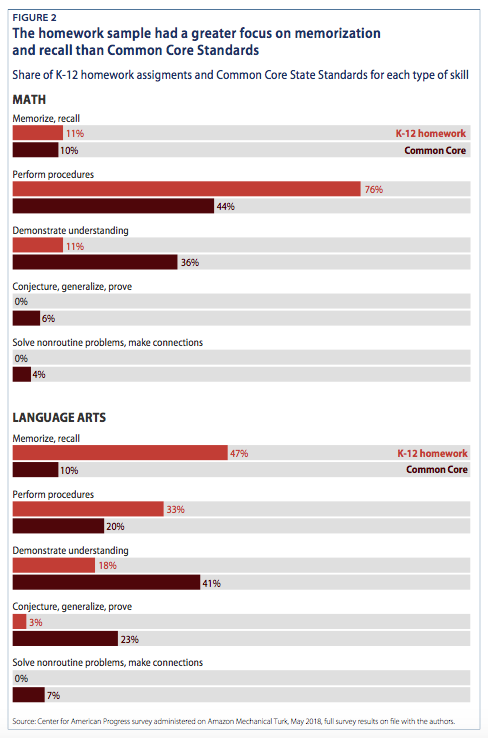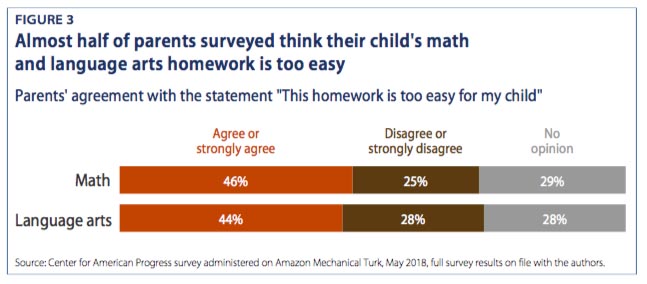Is Homework Too Easy? With Half of Parents Expressing Concerns, New Study Says Students’ Assignments Lack Rigor, Favor Lower-Level Skills

This is the latest article in The 74’s ongoing ‘Big Picture’ series, bringing American education into sharper focus through coverage of the latest data and research. Get new additions delivered straight to your inbox by signing up for The 74 Newsletter.
Here’s a double dose of bad news for kids more keen on playing Fortnite than analyzing text: Not only is homework worthwhile, but much of the take-home exercises students receive today is too easy, according to a new study from the Center for American Progress.
These latest findings are based on an analysis of nearly 200 homework assignments submitted by parents across the country. The researchers evaluated the assignments to determine whether students are being asked to demonstrate knowledge and skills in line with academic standards for their respective grade levels. While assignments largely aligned to Common Core State Standards, they tended to focus on lower-level skills, not the ones students will need to demonstrate mastery.
“Most of the assignments were fairly rote and often did not require students to demonstrate the full depth of knowledge required of the content standards,” the report states. “There was clear emphasis on procedural knowledge, and an even stronger emphasis on memorization and recall in language arts. Common Core content standards, on the other hand, require students to demonstrate deeper knowledge skills, such as the ability to analyze, conceptualize, or generate.”
Meg Benner, a senior consultant at the progressive Center for American Progress, co-authored the study with Ulrich Boser, a senior fellow at the Center, and John Smithson, a researcher emeritus at the University of Wisconsin-Madison.
“The goal is not necessarily to push a child to their limit, but more just push a child to think critically in the work that they’re doing rather than just breeze through a math worksheet for five minutes, circling the greater number,” Benner said. “We’re not recommending homework be harder for harder’s sake or longer for longer’s sake. We really think that it should just be aligned so that the homework students are working on with their parents is valuable and provides kids an opportunity to have more exposure to grade-level content, which we know from other studies is critically important.”
These findings come in contrast to a recent trend in reduced out-of-school assignments. School districts in Florida, Connecticut, and Vermont recently banned homework in some grades, arguing that students could better spend their time reading or playing.
The researchers believe their survey and report “represent the first-ever national study of homework rigor and alignment” to the Common Core standards. The standards, which 41 states and Washington, D.C., adopted beginning in 2010, teach concepts and content while emphasizing critical-thinking, problem-solving, and analytical skills.
The study focused on English language arts and math homework, primarily in elementary school grades. The differences in rigor between the assignments and the standards existed in both subjects but were more pronounced in English language arts.

Only 10 percent of the language arts standards call for a focus on memorization and recall, but 47 percent of homework assignments analyzed emphasized those lower-level skills, the study found. In math, 36 percent of the standards ask students to demonstrate understanding, a higher-level skill, but just 11 percent of assignments require that competency.
While parents may not be familiar with the specifics of the standards, many are able to gauge how much their children are being challenged. Almost half of parents with students in grades K-2 told the researchers that the homework assigned to their children was too easy.

The authors acknowledge that their study has limitations. Participants were not selected randomly; instead, parents chose to share their views and homework samples via a website that tends to draw a population younger and whiter than the United States as a whole. (The researchers note, however, that external research has shown that the site “yields high-quality, nationally representative results, with data that are at least as reliable as those obtained via traditional methods.”) The samples also only represent a point-in-time look at individual classrooms, not a comprehensive examination of assignments given over the course of a school year.
While the authors say research shows that high-quality homework boosts academic achievement and helps develop strong work habits, they don’t believe students should be inundated with afterschool assignments. They endorse the guidance set in 2006 by a group led by Harris Cooper, a professor at Duke University, who suggested 10 minutes of homework for every grade. In other words, third-graders should receive 30 minutes of homework, sixth-graders should receive 60 minutes of homework, and so on.
Parents and educators looking to act on the study’s findings can do periodic audits of homework assignments to assess rigor. The researchers also suggest that parents who want to ensure their children have Common Core-aligned exercises utilize third-party sites, such as Khan Academy, provided they have internet access.
Benner, the Center for American Progress consultant who is also a former teacher, said that overall, there is a way for teachers to push their students’ thinking without overly burdening students or their parents.
“When we saw some of the homework assignments that we thought required a higher level of cognitive demand, they didn’t necessarily require a child to master a new idea or do something that was significantly more challenging than they would necessarily be prepared to do,” she said.
Go Deeper: This is the latest article in The 74’s ongoing ‘Big Picture’ series, bringing American education into sharper focus through coverage of the latest data and research. Get new additions delivered straight to your inbox by signing up for The 74 Newsletter.
Get stories like these delivered straight to your inbox. Sign up for The 74 Newsletter

;)